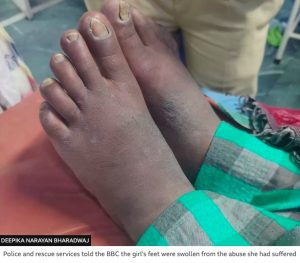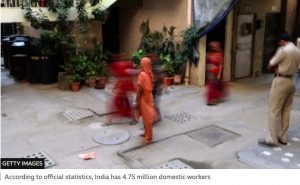Indian police and social workers rescued a battered and bruised 14-year-old last week from the home in a Delhi suburb where she worked as a domestic helper. Experts say such workers are vulnerable to exploitation because of a lack of will and legal safeguards to protect them.
The girl, who was brought to hospital with multiple injuries, told police that she had been tortured by her employers over five months.
“She was in an extremely pathetic condition,” said journalist and documentary filmmaker Deepika Narayan Bharadwaj, who tipped off the child rescue services after hearing about the girl from a friend.
“A friend called and told me that while visiting his relatives in Gurgaon [a Delhi suburb], he’d seen this girl when she was taking out trash. He said her face was bloodied and covered in bruises,” Ms Bharadwaj told me.
When Ms Bharadwaj met the teenager in hospital, she heard first-hand her account of the horrific treatment she is said to have endured.
“She told me that she was beaten every day, in fact several times a day, for not completing work on time,” she said.
Police have arrested the girl’s employers, Manish Khattar and his wife Kamaljeet Kaur, and charged them under various sections of the law. Police claim the girl’s injuries are consistent with torture.
A police official told The Indian Express that “the couple allegedly used to beat her mercilessly for not working properly. She has several cut and burn injuries, suspected to have been inflicted with a blade or hot tongs”.
“The girl had injuries on several parts of her body – face, arms, hands and feet. On one of her arms, her skin had been burnt,” he said, adding that “a medical examination has been conducted and legal action will be taken.”
The photos the BBC has seen of the injuries sustained by the girl show cuts and burns to her face and body. They are too distressing to include in this article.
In her statement to the police, the girl has also alleged that her employers forced her to “take off her clothes while doing laundry and other chores and she was made to sleep on the floor… without clothes”.
This appears to have prompted them to charge the couple with sexual harassment under the Protection of Children from Sexual Offences (Pocso) Act. The couple are in police custody and have not commented on the allegations yet. The BBC has attempted to get in touch with the couple’s legal representatives but has been unable to get a response.

Police said Mr Khattar worked as a deputy manager with a prominent life insurance company and his wife was working with a public relations firm. Since the allegations surfaced, the couple have been sacked by their companies.
“They were treating her like a slave,” comments Nishi Kant, executive director of anti-trafficking NGO Shakti Vahini that is working with the girl now. “She was not given enough food and was compelled to eat from the dustbin.
“We are also trying to find out who is the uncle who brought her to Gurgaon, which is the placement agency which got her the job and what happened to her remuneration because she never got paid,” he said.
The brutality the girl was made to suffer has shocked India and made headlines but campaigners point out that claims of abuse and exploitation of domestic helpers are not infrequent in a country where millions of women and children, both boys and girls, from poor families work as servants in affluent and middle class homes.
In 2013, police in Delhi arrested a 50-year-old woman for assaulting and torturing her 15-year-old maid. The girl had a severe head injury and bite marks on her body.
The previous year, a doctor couple from the city were arrested for locking up their 13-year-old domestic servant and going on holiday to Thailand. Neighbours alerted police and activists after they heard the girl crying and screaming for help from the balcony.
One thing that was common in all three cases is that the victims were from Jharkhand, one of the poorest states in India.

“Because of extreme poverty, girls drop out of school on hitting puberty. They’re then lured with promises of jobs to Delhi and other cities by dodgy employment agencies that are not registered,” says Rishi Kant, spokesman for Shakti Vahini.
“In the city, they are placed in homes of people where they are often in exploitative situations. Many are assaulted, they have few freedoms.”
According to official statistics, India has 4.75 million domestic workers, including three million women. But the International Labour Organisation (ILO) estimates the true numbers to be between 20 and 80 million.
That’s because in India, housework involves a lot of heavy lifting. Since few homes are equipped with dishwashers, vacuum cleaners or washing machines, nearly all middle class and affluent families hire workers for sweeping, cleaning dishes, laundry, cooking and childcare. The law says children above 14 can also be employed as housework is not considered hazardous.
The arrangement is an important livelihood source for those with little or no education – but Meenakshi Gupta Jain, who runs Helper4U, an online portal that connects workers with employers, says it also opens them to all sorts of exploitation.
“What makes domestic helpers so vulnerable to exploitation is that they have no legal contract, there are no minimum guaranteed wages, the prevention of sexual harassment act which protects women in workspaces does not apply to them, and far away from their homes, many have no support system.
“Even if they are hit, they have no one to turn to for help,” she says, adding that “such instances will keep happening until and unless we bring in strict legislation with strict penalties, act against agencies and employers”.
Ms Jain says that children are especially vulnerable and although “the government says that children can work at home because home is not hazardous, behind closed doors a home can be the most hazardous workplace in the world”.

But the plight of domestic workers is rarely talked about in India, unless a particularly brutal case makes headlines.
Ms Jain says there must be public messaging to tell Indians that it’s important to treat domestic staff well.
“We are creating hype about all sorts of things, so why not create hype about how we should be treating the domestic help?”
Mr Kant says that an anti-trafficking bill that’s been pending in parliament for years now must be passed if the issue is to be addressed.
“Those bringing vulnerable girls and placing them in exploitative situations need to be targeted and punished.”
Under the current laws, Mr Kant says it’s not going to be easy to punish the couple accused of assaulting their maid.
“We have a tough battle ahead. Plenty of similar cases happen, but most end in nothing. Quite often, the family of the victim take the money and settle out of court.”
In the 2013 case, he points out that the 50-year-old woman was bailed after a month. It took the court four years to convict her, and in the end she was let go with a fine of just 1,000 rupees ($12; £10).
